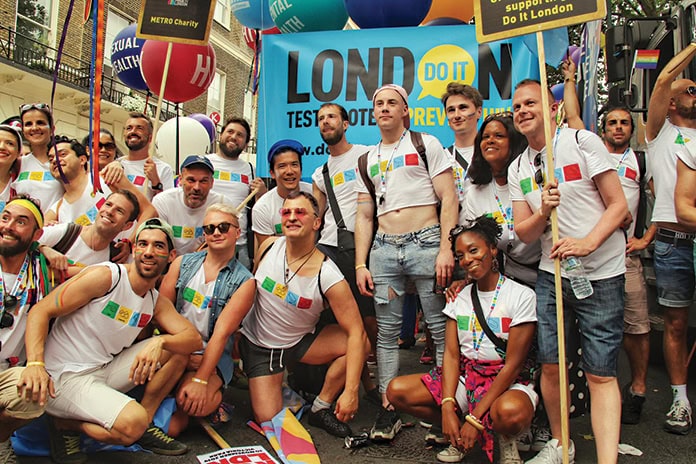The HIV charity aiming for zero new diagnoses
Pride weekend saw the launch of a new Do It London campaign, promoting the many ways to prevent HIV and challenging stigma. The campaign also challenges London to reach zero new infections. Is this really achievable?
Paul Steinberg, Lead Commissioner of the London HIV Prevention Programme:
It might seem hard to imagine, a time where we see zero new HIV infections. But in fact, London as a city has committed to end HIV transmission by 2030, and is the capital is leading the way internationally on HIV prevention. We’re already seeing a reduction in new diagnoses because combination prevention – the methods we promote – is very effective. But of course there’s no guarantee; if we want to achieve zero new infections it’s more important than ever that we all keep choosing the proven ways to prevent HIV and go further, faster to end this epidemic.
We’ve seen the Do It London campaign in London since 2015, haven’t we?
That’s right – this is the latest phase of the Do It London campaign – the same campaign that you’ll have seen in gay venues bringing you free condoms and lube, as well as rapid HIV testing and sexual health advice for many years. Back in summer 2017, it was also the first official public campaign in the UK to advertise PrEP and undetectable HIV status as core HIV prevention options alongside the more recognised methods such as condom use and regular testing. And it was the political leaders of London boroughs who created the London HIV Prevention Programme back in 2013, and who we should thank for their continued commitment to preventing HIV, especially in these very tough times for public sector finances.
What messages does the campaign have for gay men specifically?
The 2019 Do It London campaign shares the encouraging news about HIV trends in London. The number of gay and bisexual men with HIV in London dropped by 40% between 2015 and 2017, largely due to the effectiveness of four different but complementary methods of HIV prevention. Regular testing, using condoms, PrEP and U=U (undetectable = untransmittable). We are asking gay men need to understand which methods work best for them and keep making safer choices to protect themselves and their partners.
So it’s all good news then, rates are going down?
Well not quite – yes, combination prevention is working and we’re seeing fewer new diagnoses. But London still has a much higher overall diagnosis rate than the rest of England, and on average 35% of all new diagnoses are late. Late diagnosis means poorer health outcomes for the individual, but it also means further transmission of HIV because someone who doesn’t know they are positive will not be getting treatment to become undetectable.
Can you tell us more about what’s causing the reduction in new diagnoses?
Increased uptake of testing has been vital, including the increased number of times men are getting tested throughout the year. But also important has been the increased knowledge of U=U (Undetectable = Untransmittable). People on effective treatment can’t pass on the virus. Getting diagnosed promptly allows someone to access the world-class care we have via the NHS, protecting their health and preventing onwards transmission.
Use of PrEP (a pill that protects against HIV infection) has certainly contributed to the reduction as well as – London has over 10,000 places on the PrEP IMPACT trial and we are lobbying government hard to make PrEP more available to everyone who needs it. And of course ongoing condom use is still playing a huge role in preventing HIV and other STIs.
What are some of the challenges to us getting to zero new infections?
Stigma and a lack of knowledge about HIV remain a problem, and we know that people still have misconceptions about PrEP and U=U. Fearful attitudes towards testing and potential diagnosis means we still have people living in this city unaware of their HIV infection, even though testing rates have gone up sharply in recent years. Public Health England estimates there could be around 1,000 gay or bisexual Londoners living with undiagnosed HIV.
The gay community have more knowledge than most about HIV. Should we still be trying to learn more?
Well, certain misconceptions and beliefs, held by a minority of individuals in the gay community, can be unhelpful in tackling HIV rates and encouraging healthy sexual behaviour. When we held focus groups with gay men there were mixed attitudes to PrEP, with a small number of men under the impression that PrEP prevents other STIs in addition to HIV. This is not true. PrEP still should be used in combination with the other HIV prevention methods. Also some gay men still demonstrate a lot of stigmatising attitudes about HIV, whether that’s slut shaming people who use PrEP, or discriminating against someone else on the basis of their perceived status. That has to stop: it’s just so unhelpful and damaging to our community health and well-being. There are still gay men who don’t know about U=U. This is why we have this campaign.
Has PrEP been a real game changer? A lot of men might think this was the major reason for the downturn.
Well actually Public Health England tell us that increased testing coupled with early treatment to achieve undetectable status and reduce further transmission, have been the major contributors to the reduction. But PrEP is certainly a proven, effective HIV prevention measure which has been proven to be effective in preventing HIV – and it also provides people with control of their sex lives. It will play an increasingly important role in our efforts to achieve zero new infections.
Of course we have to remember PrEP doesn’t protect against other STIs. Those on the PrEP IMPACT trial attend clinics for HIV and STI testing more regularly than people who don’t use the drug, which is a great thing for picking up other infections and treating them promptly. It is for these reasons that London boroughs have supported the expansion of the trial by 60% this summer, which will absolutely help reduce HIV transmission in the capital.
For more information and signposting to HIV and STI help visit: doitlondon.org You can follow the campaign on Twitter @DoItLDN and Facebook DoItLDN
READ MORE:
An Influential HIV Prevention Campaign is Tackling Rising STIs in London



















